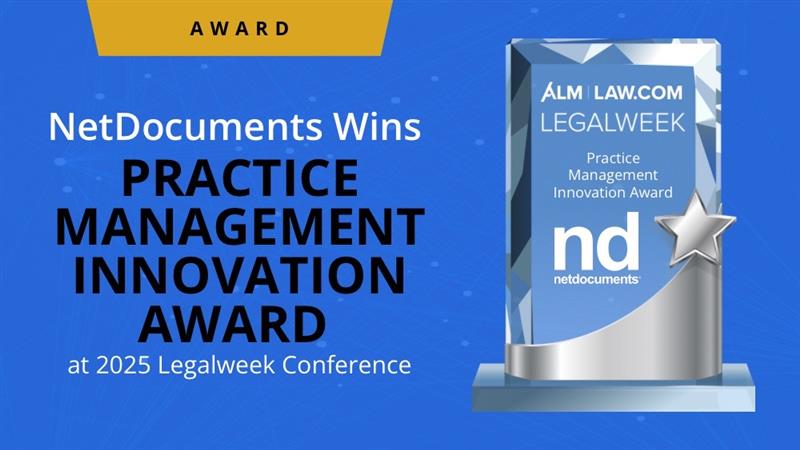
Blog
How Can Document Management Help Corporate Legal Teams? Part 1: Collaboration

Although both law firms and corporate legal departments have lawyers, the needs of these two groups can differ significantly. And the reality is that many legal software tools are designed to meet the needs of law firms … but they might not be as well suited for their in-house counterparts.
In part one of our series on how a document management system (DMS) can also deliver unique benefits specifically for corporate legal teams, we’re diving deep into the power of effective collaboration.
Why does collaboration matter for in-house legal teams?
It’s no secret: Most corporate legal departments already have too much on their plate.
But staying siloed won’t solve the issue. In fact, isolation “can impair the individual lawyer’s growth and career development, … clog communication channels within the department, … [and] create unintended obstacles to the company’s business objectives.” (Source)
That’s a big problem — one that affects the rest of the business.
With diverse requests coming in from across the organization, external counsel to manage, and increasing pressure to drive business growth, in-house legal teams need to be able to do more with less.
And successful collaboration is key.
5 Ways a DMS Supports Collaboration
Given all the responsibilities that legal departments must manage — and the varied parties they need to collaborate with — how can a DMS help?
1. A Single Source of Truth
Perhaps the most important feature of an effective DMS is that it is a centralized source of truth. Since so much of legal work happens on documents that have to be passed from one person to another, having multiple (conflicting) sources of truth can severely derail a project — and any benefits that might have been gleaned by collaborating.
Having a single source of the truth ensures that your team can collaborate with confidence knowing they are collaborating on the latest, most up to date version of a document.
2. Version Control & History
In that same vein, a modern DMS typically offers detailed version control, so you can always be confident that you’re working with the most current version of a document, rather than parsing your way through ambiguous version numbers and user initials. And if you need to trace back to a previous version, you can easily work through the document’s history.
3. Anywhere Access
Cloud-based document management solutions bring even more capabilities to the table, like the ability to access your files remotely — from any device, whether you’re working from home or on the go. Remote collaboration means you can jump in to review changes or respond to comments whenever and wherever you need to.
4. Improved Workflows
Working with a cloud-based DMS can also enable teams to effectively organize documents in a way that supports legal workflows, easily search for and find documents you need, and work seamlessly with productivity tools and applications you already use. These kinds of features improve workflows and support lawyers as they strive to deliver quality services faster and more efficiently.
5. Secure Sharing
When it’s time to share and collaborate on confidential legal documents with team members, external counsel, or internal business clients, a DMS can help you keep your documents secure. Whether you use a secure link or set up a secure workspace for collaboration, you can be confident that your files and data are encrypted and safe.
What are the benefits of improved collaboration for corporate legal teams?
Done right, collaboration can help your operations get more work done faster, smarter, and with better outcomes.
Improved Business Relationships
As legal departments are able to collaborate and communicate more effectively with internal business clients, both parties will come to understand one another better. For the legal team, this means a better understanding of the business and how to support each unit’s needs and priorities.
Meanwhile, the business units will grow to have a better understanding of how the legal team operates, as well as what types of time frames and expectations for legal requests are reasonable.
With stronger mutual understanding, in-house legal teams can develop stronger, more effective relationships with both individual business units and the organization as a whole — something leadership will find hard to ignore.
Greater Efficiency
Collaboration empowers the legal department to leverage the strengths of each team member and the collective expertise of the whole. While this can be challenging, particularly when many teams are still working remotely, controlled collaboration can help you find solutions and move work forward faster than the delayed back-and-forth of email.
Stronger Understanding
“Bringing together knowledge and data from multiple disciplines and sources encourages a global perspective of challenges and a more holistic awareness of their solutions,” writes CEO and General Counsel Olga Mack.
It can be easy to rely solely on the expertise of the legal department and outside counsel in legal matters — but collaborating with others (even non-lawyers) can reveal new perspectives and lead to a more complete understanding of a project or problem.
Better Results
According to Forbes, “Organizations that collaborate internally…are far more likely to succeed than those that do not.” While this may seem obvious, it is not always easy to achieve.
While it’s certainly true that you don’t want to have too many cooks in the kitchen, it may be a bigger risk to fly solo. Whether it’s catching errors or introducing new ideas, collaboration seems to consistently lead to better outcomes for the business.
When great legal minds think alike. That’s Work Inspired.
Relationships are key to your success. Whether that’s within the legal department or with business units across the organization, you cannot effectively build and protect the business unless your expertise is both trusted and sought after.
That’s why technology that supports your collaborative efforts is so essential for modern teams. You need systems like NetDocuments that integrate with your organization’s technology stack and tie you closer to your peers, while streamlining your own critical compliance and security efforts.
Once you can help everyone in your organization view challenges and opportunities from the perspective of a lawyer, you can rest assured that your team has become the strategic partner it was meant to be.
Want to learn more? Read the corporate legal department’s Definitive Guide to Document Management.
More from the blog
-

- Blog
NetDocuments Wins Practice Management Innovation Award at 2025 Legalweek Conference
NetDocuments is proud to announce a new accolade for our intelligent…
-

- Blog
Ready-to-Go AI Apps for Legal Use Cases Available Now in the New ndMAX Studio
Legal professionals are looking for smarter, faster, secure ways to harness…
-

- Blog
AI-Driven Legal Tech Trends for 2025
With 79% of law firm professionals now incorporating AI tools into…
-

- Blog
Convincing Corporate IT That Legal Really Is Different: Making the Case for Corporate Legal Department Software
Explore the unique challenges legal operations leaders face in advocating for…
netdocuments


